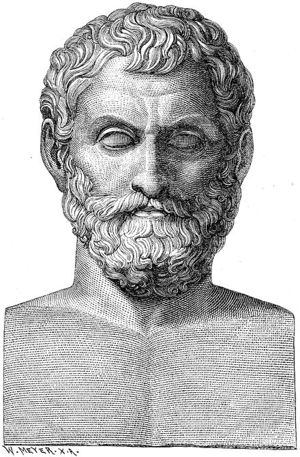Difference between revisions of "Thales"
From The Flat Earth Wiki
(Created page with "Thales of Miletus (624 BC - 546 BC) is considered by many to be "the first Greek philosopher". His denial of mythology as an acceptable explanation for natural phenomena is a ...") |
|||
| Line 1: | Line 1: | ||
| − | Thales of Miletus (624 BC - 546 BC) is considered by many to be "the first Greek philosopher". His denial of mythology as an acceptable explanation for natural phenomena is a fundamental component of the scientific revolution. He aimed to explain what he could see using reason. | + | [[File:Thales.jpeg|thumb|]]Thales of Miletus (624 BC - 546 BC) is considered by many to be "the first Greek philosopher". His denial of mythology as an acceptable explanation for natural phenomena is a fundamental component of the scientific revolution. He aimed to explain what he could see using reason. |
For example, Thales theorized that earthquakes were not a result of divine intervention or other supernatural occurences, but rather that the earth floats in an ocean of water, and that earthquakes are a result of waves crashing into the earth. | For example, Thales theorized that earthquakes were not a result of divine intervention or other supernatural occurences, but rather that the earth floats in an ocean of water, and that earthquakes are a result of waves crashing into the earth. | ||
Revision as of 05:32, 5 December 2013
Thales of Miletus (624 BC - 546 BC) is considered by many to be "the first Greek philosopher". His denial of mythology as an acceptable explanation for natural phenomena is a fundamental component of the scientific revolution. He aimed to explain what he could see using reason.
For example, Thales theorized that earthquakes were not a result of divine intervention or other supernatural occurences, but rather that the earth floats in an ocean of water, and that earthquakes are a result of waves crashing into the earth.

